Annotated Bibliography: Security and Data Management in Cloud Storage
VerifiedAdded on 2020/02/18
|11
|3157
|50
Annotated Bibliography
AI Summary
This annotated bibliography presents a collection of eleven articles focusing on various aspects of cloud storage security. The articles cover critical topics such as data integrity, access control, data sharing, and auditing within cloud environments. Several papers address the challenges of ensuring data security in multi-authority cloud storage systems, exploring schemes for effective access control and revocation. The bibliography also highlights research on key-aggregate cryptosystems for scalable data sharing and dynamic auditing protocols for data storage. Furthermore, it examines consistency-based service level agreements, secure role-based access control, and data integrity protection in regenerating-coding-based cloud storage. Additional articles delve into smart cloud storage service selection using fuzzy logic, network-level efficiency for cloud storage services, and the integration of secure network coding with secure cloud storage. The collection provides a comprehensive overview of the current research landscape and the challenges and solutions associated with securing data in cloud environments.
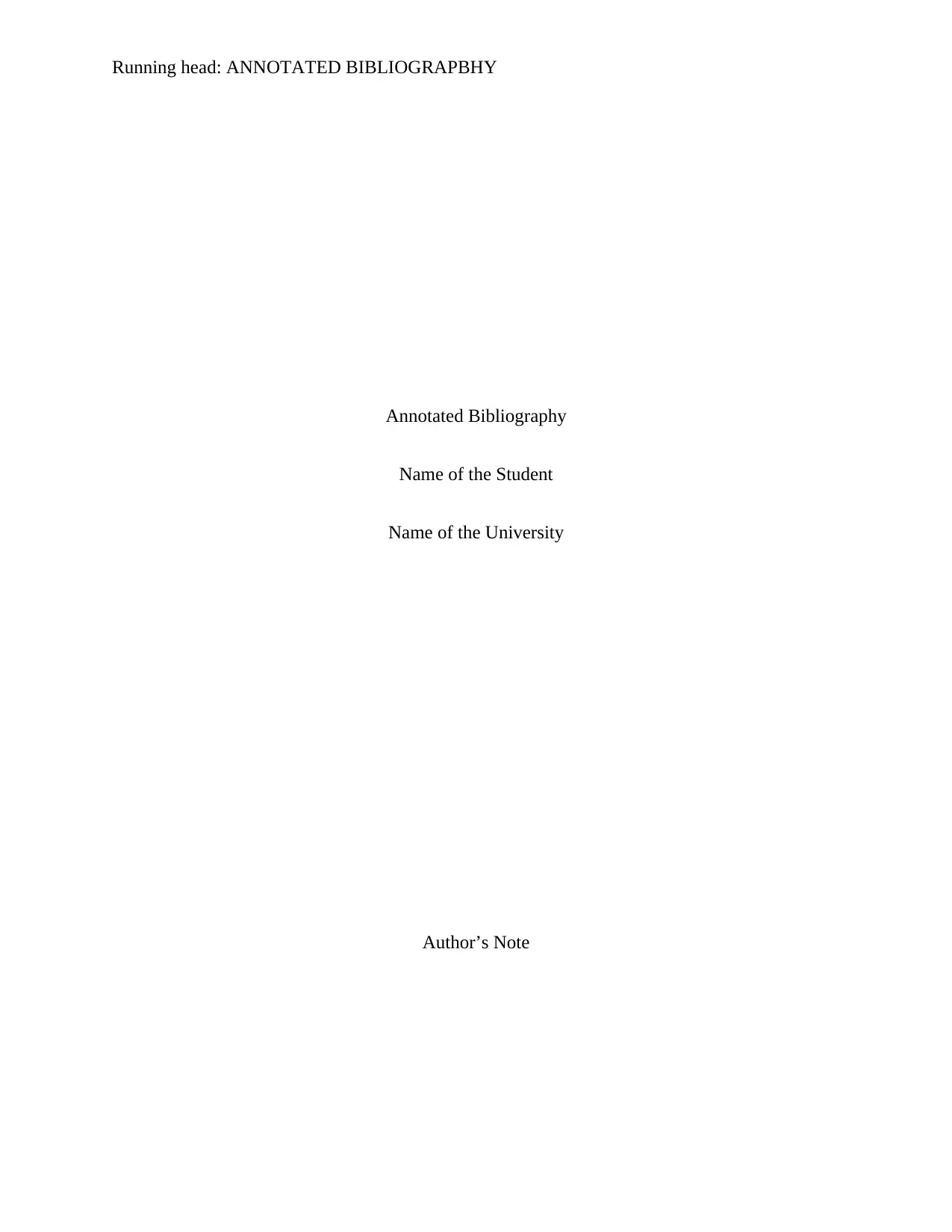
Running head: ANNOTATED BIBLIOGRAPBHY
Annotated Bibliography
Name of the Student
Name of the University
Author’s Note
Annotated Bibliography
Name of the Student
Name of the University
Author’s Note
Paraphrase This Document
Need a fresh take? Get an instant paraphrase of this document with our AI Paraphraser
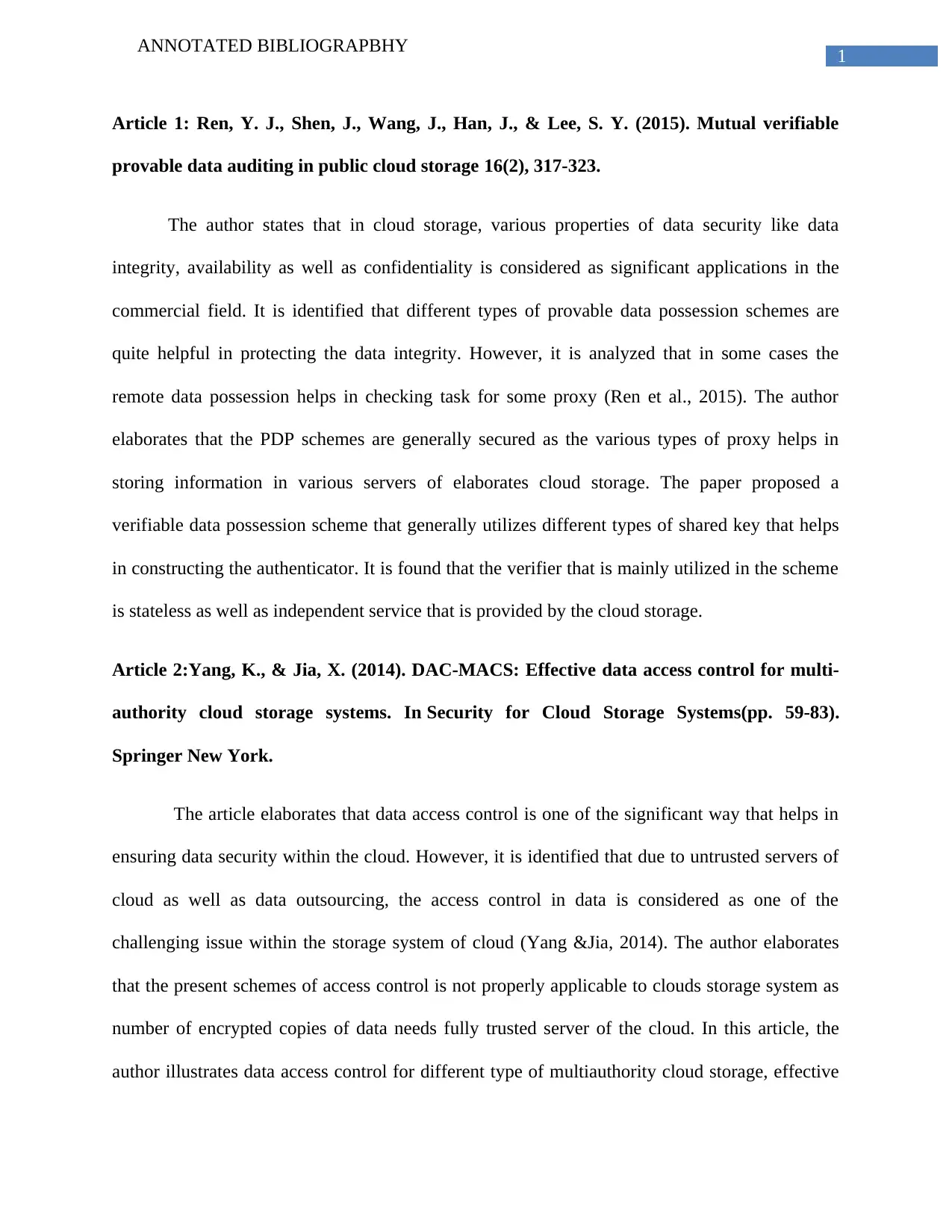
1
ANNOTATED BIBLIOGRAPBHY
Article 1: Ren, Y. J., Shen, J., Wang, J., Han, J., & Lee, S. Y. (2015). Mutual verifiable
provable data auditing in public cloud storage 16(2), 317-323.
The author states that in cloud storage, various properties of data security like data
integrity, availability as well as confidentiality is considered as significant applications in the
commercial field. It is identified that different types of provable data possession schemes are
quite helpful in protecting the data integrity. However, it is analyzed that in some cases the
remote data possession helps in checking task for some proxy (Ren et al., 2015). The author
elaborates that the PDP schemes are generally secured as the various types of proxy helps in
storing information in various servers of elaborates cloud storage. The paper proposed a
verifiable data possession scheme that generally utilizes different types of shared key that helps
in constructing the authenticator. It is found that the verifier that is mainly utilized in the scheme
is stateless as well as independent service that is provided by the cloud storage.
Article 2:Yang, K., & Jia, X. (2014). DAC-MACS: Effective data access control for multi-
authority cloud storage systems. In Security for Cloud Storage Systems(pp. 59-83).
Springer New York.
The article elaborates that data access control is one of the significant way that helps in
ensuring data security within the cloud. However, it is identified that due to untrusted servers of
cloud as well as data outsourcing, the access control in data is considered as one of the
challenging issue within the storage system of cloud (Yang &Jia, 2014). The author elaborates
that the present schemes of access control is not properly applicable to clouds storage system as
number of encrypted copies of data needs fully trusted server of the cloud. In this article, the
author illustrates data access control for different type of multiauthority cloud storage, effective
ANNOTATED BIBLIOGRAPBHY
Article 1: Ren, Y. J., Shen, J., Wang, J., Han, J., & Lee, S. Y. (2015). Mutual verifiable
provable data auditing in public cloud storage 16(2), 317-323.
The author states that in cloud storage, various properties of data security like data
integrity, availability as well as confidentiality is considered as significant applications in the
commercial field. It is identified that different types of provable data possession schemes are
quite helpful in protecting the data integrity. However, it is analyzed that in some cases the
remote data possession helps in checking task for some proxy (Ren et al., 2015). The author
elaborates that the PDP schemes are generally secured as the various types of proxy helps in
storing information in various servers of elaborates cloud storage. The paper proposed a
verifiable data possession scheme that generally utilizes different types of shared key that helps
in constructing the authenticator. It is found that the verifier that is mainly utilized in the scheme
is stateless as well as independent service that is provided by the cloud storage.
Article 2:Yang, K., & Jia, X. (2014). DAC-MACS: Effective data access control for multi-
authority cloud storage systems. In Security for Cloud Storage Systems(pp. 59-83).
Springer New York.
The article elaborates that data access control is one of the significant way that helps in
ensuring data security within the cloud. However, it is identified that due to untrusted servers of
cloud as well as data outsourcing, the access control in data is considered as one of the
challenging issue within the storage system of cloud (Yang &Jia, 2014). The author elaborates
that the present schemes of access control is not properly applicable to clouds storage system as
number of encrypted copies of data needs fully trusted server of the cloud. In this article, the
author illustrates data access control for different type of multiauthority cloud storage, effective
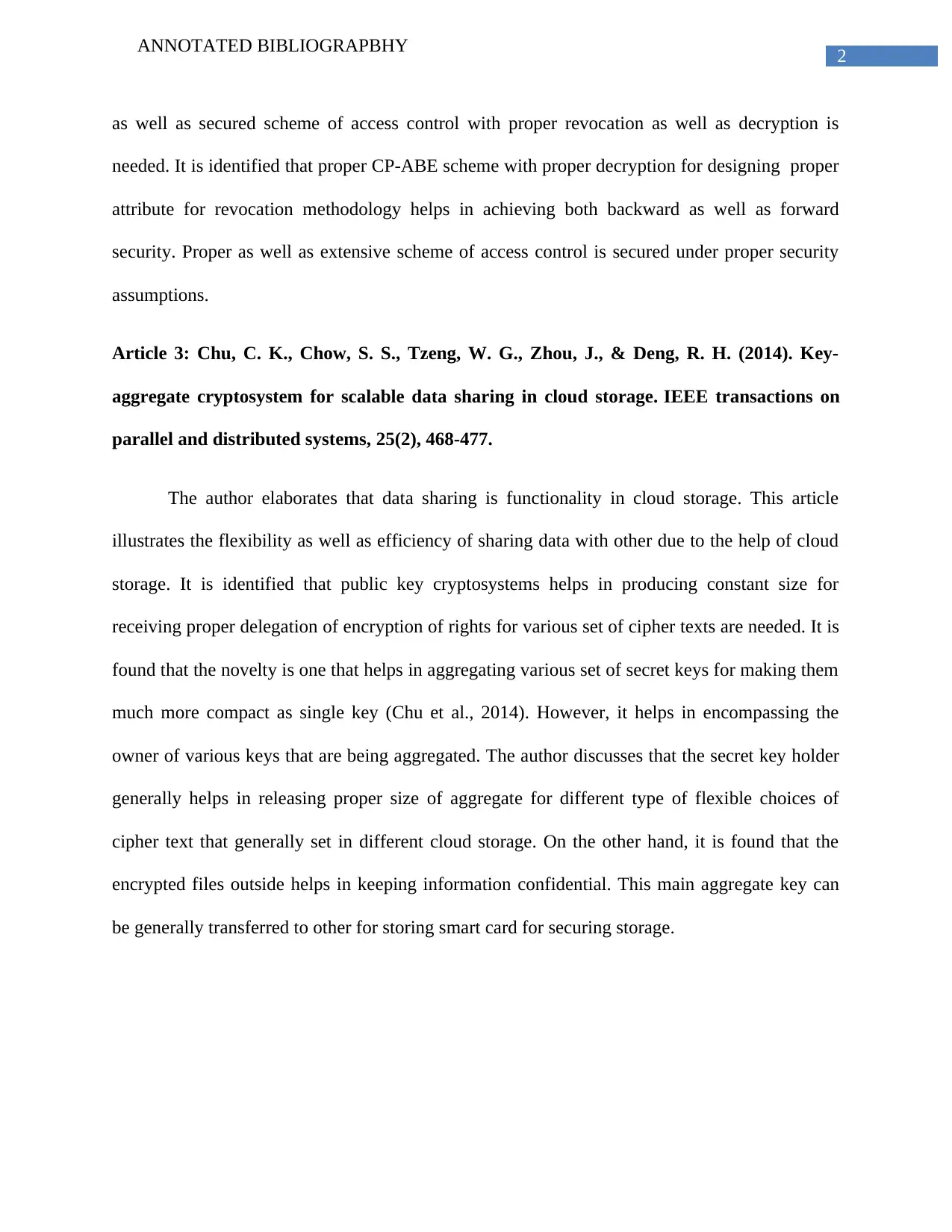
2
ANNOTATED BIBLIOGRAPBHY
as well as secured scheme of access control with proper revocation as well as decryption is
needed. It is identified that proper CP-ABE scheme with proper decryption for designing proper
attribute for revocation methodology helps in achieving both backward as well as forward
security. Proper as well as extensive scheme of access control is secured under proper security
assumptions.
Article 3: Chu, C. K., Chow, S. S., Tzeng, W. G., Zhou, J., & Deng, R. H. (2014). Key-
aggregate cryptosystem for scalable data sharing in cloud storage. IEEE transactions on
parallel and distributed systems, 25(2), 468-477.
The author elaborates that data sharing is functionality in cloud storage. This article
illustrates the flexibility as well as efficiency of sharing data with other due to the help of cloud
storage. It is identified that public key cryptosystems helps in producing constant size for
receiving proper delegation of encryption of rights for various set of cipher texts are needed. It is
found that the novelty is one that helps in aggregating various set of secret keys for making them
much more compact as single key (Chu et al., 2014). However, it helps in encompassing the
owner of various keys that are being aggregated. The author discusses that the secret key holder
generally helps in releasing proper size of aggregate for different type of flexible choices of
cipher text that generally set in different cloud storage. On the other hand, it is found that the
encrypted files outside helps in keeping information confidential. This main aggregate key can
be generally transferred to other for storing smart card for securing storage.
ANNOTATED BIBLIOGRAPBHY
as well as secured scheme of access control with proper revocation as well as decryption is
needed. It is identified that proper CP-ABE scheme with proper decryption for designing proper
attribute for revocation methodology helps in achieving both backward as well as forward
security. Proper as well as extensive scheme of access control is secured under proper security
assumptions.
Article 3: Chu, C. K., Chow, S. S., Tzeng, W. G., Zhou, J., & Deng, R. H. (2014). Key-
aggregate cryptosystem for scalable data sharing in cloud storage. IEEE transactions on
parallel and distributed systems, 25(2), 468-477.
The author elaborates that data sharing is functionality in cloud storage. This article
illustrates the flexibility as well as efficiency of sharing data with other due to the help of cloud
storage. It is identified that public key cryptosystems helps in producing constant size for
receiving proper delegation of encryption of rights for various set of cipher texts are needed. It is
found that the novelty is one that helps in aggregating various set of secret keys for making them
much more compact as single key (Chu et al., 2014). However, it helps in encompassing the
owner of various keys that are being aggregated. The author discusses that the secret key holder
generally helps in releasing proper size of aggregate for different type of flexible choices of
cipher text that generally set in different cloud storage. On the other hand, it is found that the
encrypted files outside helps in keeping information confidential. This main aggregate key can
be generally transferred to other for storing smart card for securing storage.
⊘ This is a preview!⊘
Do you want full access?
Subscribe today to unlock all pages.

Trusted by 1+ million students worldwide
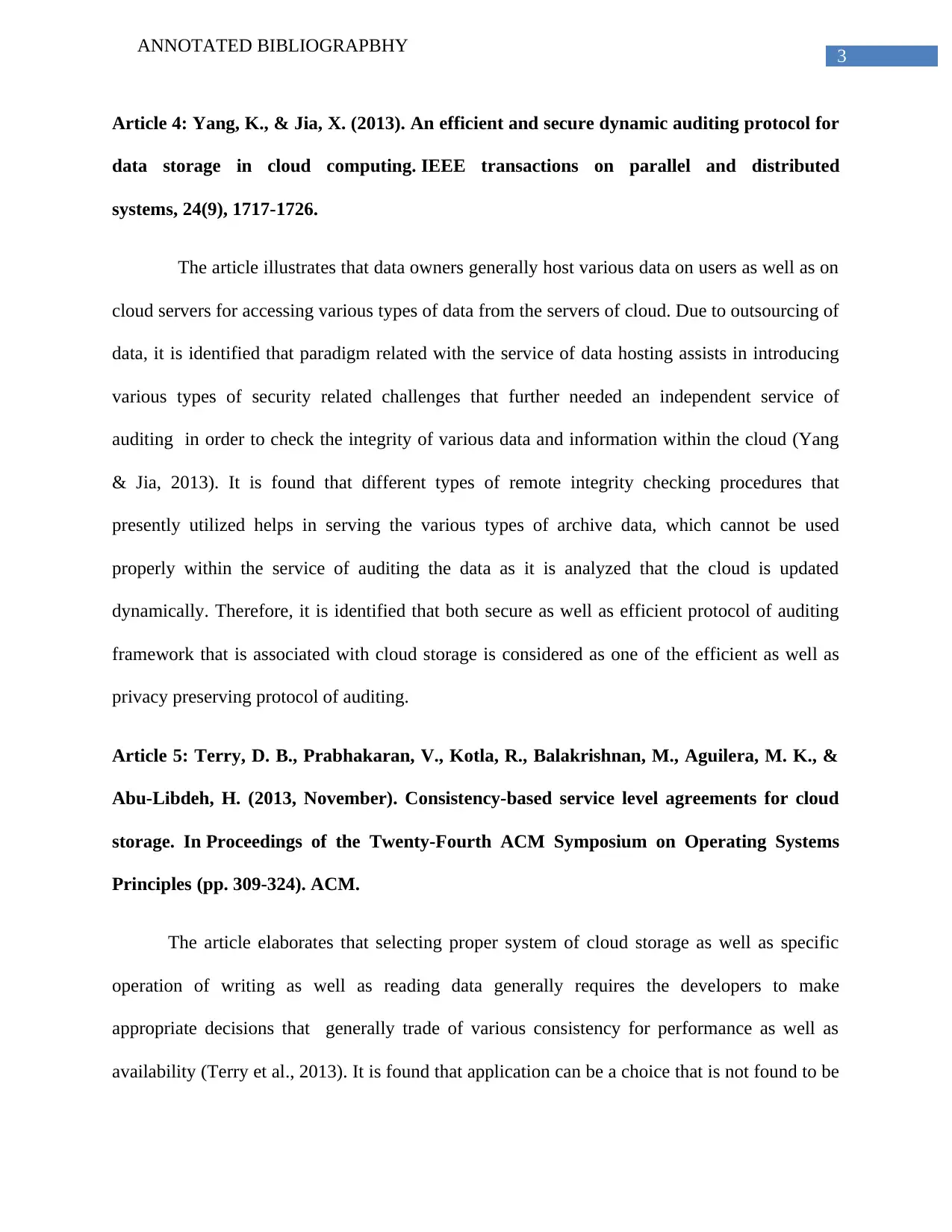
3
ANNOTATED BIBLIOGRAPBHY
Article 4: Yang, K., & Jia, X. (2013). An efficient and secure dynamic auditing protocol for
data storage in cloud computing. IEEE transactions on parallel and distributed
systems, 24(9), 1717-1726.
The article illustrates that data owners generally host various data on users as well as on
cloud servers for accessing various types of data from the servers of cloud. Due to outsourcing of
data, it is identified that paradigm related with the service of data hosting assists in introducing
various types of security related challenges that further needed an independent service of
auditing in order to check the integrity of various data and information within the cloud (Yang
& Jia, 2013). It is found that different types of remote integrity checking procedures that
presently utilized helps in serving the various types of archive data, which cannot be used
properly within the service of auditing the data as it is analyzed that the cloud is updated
dynamically. Therefore, it is identified that both secure as well as efficient protocol of auditing
framework that is associated with cloud storage is considered as one of the efficient as well as
privacy preserving protocol of auditing.
Article 5: Terry, D. B., Prabhakaran, V., Kotla, R., Balakrishnan, M., Aguilera, M. K., &
Abu-Libdeh, H. (2013, November). Consistency-based service level agreements for cloud
storage. In Proceedings of the Twenty-Fourth ACM Symposium on Operating Systems
Principles (pp. 309-324). ACM.
The article elaborates that selecting proper system of cloud storage as well as specific
operation of writing as well as reading data generally requires the developers to make
appropriate decisions that generally trade of various consistency for performance as well as
availability (Terry et al., 2013). It is found that application can be a choice that is not found to be
ANNOTATED BIBLIOGRAPBHY
Article 4: Yang, K., & Jia, X. (2013). An efficient and secure dynamic auditing protocol for
data storage in cloud computing. IEEE transactions on parallel and distributed
systems, 24(9), 1717-1726.
The article illustrates that data owners generally host various data on users as well as on
cloud servers for accessing various types of data from the servers of cloud. Due to outsourcing of
data, it is identified that paradigm related with the service of data hosting assists in introducing
various types of security related challenges that further needed an independent service of
auditing in order to check the integrity of various data and information within the cloud (Yang
& Jia, 2013). It is found that different types of remote integrity checking procedures that
presently utilized helps in serving the various types of archive data, which cannot be used
properly within the service of auditing the data as it is analyzed that the cloud is updated
dynamically. Therefore, it is identified that both secure as well as efficient protocol of auditing
framework that is associated with cloud storage is considered as one of the efficient as well as
privacy preserving protocol of auditing.
Article 5: Terry, D. B., Prabhakaran, V., Kotla, R., Balakrishnan, M., Aguilera, M. K., &
Abu-Libdeh, H. (2013, November). Consistency-based service level agreements for cloud
storage. In Proceedings of the Twenty-Fourth ACM Symposium on Operating Systems
Principles (pp. 309-324). ACM.
The article elaborates that selecting proper system of cloud storage as well as specific
operation of writing as well as reading data generally requires the developers to make
appropriate decisions that generally trade of various consistency for performance as well as
availability (Terry et al., 2013). It is found that application can be a choice that is not found to be
Paraphrase This Document
Need a fresh take? Get an instant paraphrase of this document with our AI Paraphraser
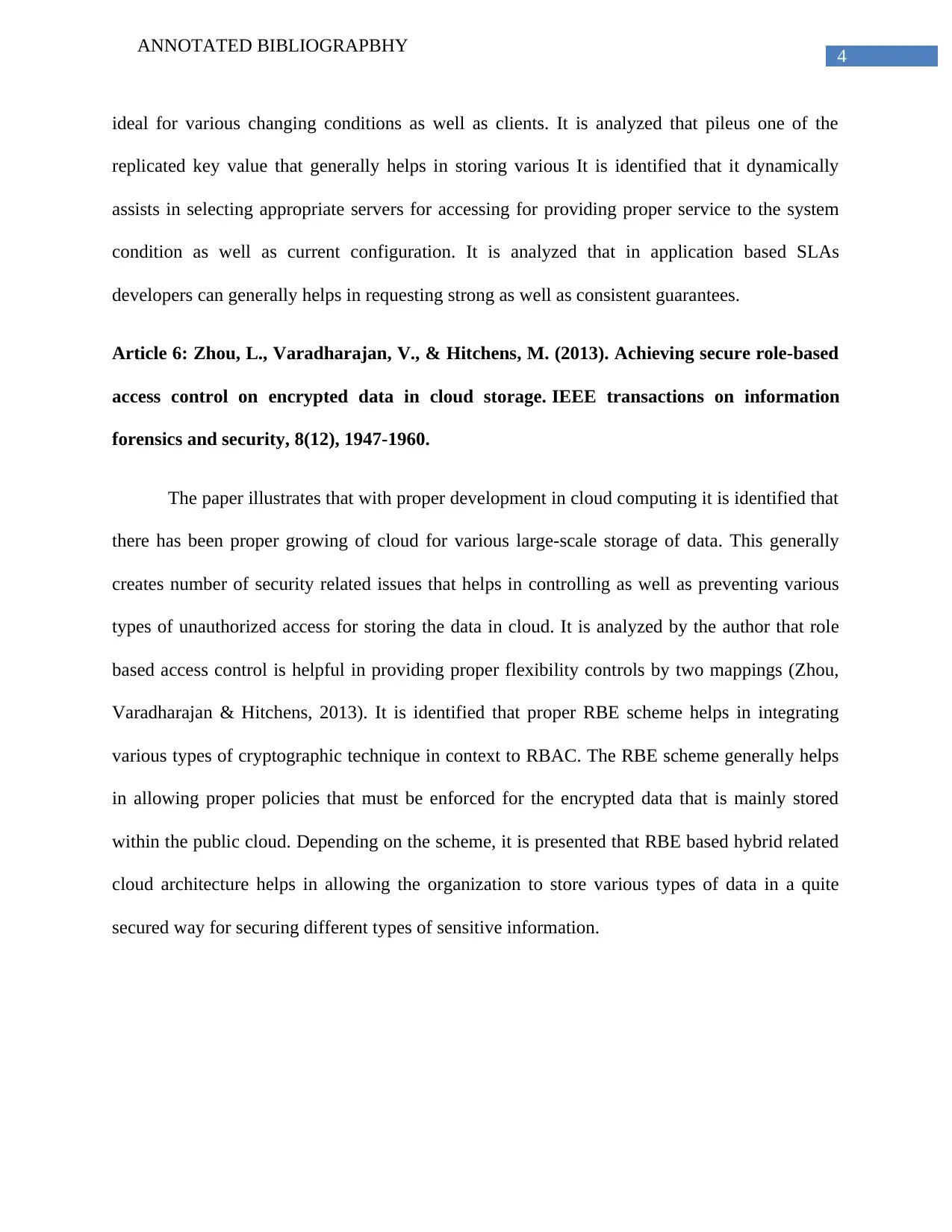
4
ANNOTATED BIBLIOGRAPBHY
ideal for various changing conditions as well as clients. It is analyzed that pileus one of the
replicated key value that generally helps in storing various It is identified that it dynamically
assists in selecting appropriate servers for accessing for providing proper service to the system
condition as well as current configuration. It is analyzed that in application based SLAs
developers can generally helps in requesting strong as well as consistent guarantees.
Article 6: Zhou, L., Varadharajan, V., & Hitchens, M. (2013). Achieving secure role-based
access control on encrypted data in cloud storage. IEEE transactions on information
forensics and security, 8(12), 1947-1960.
The paper illustrates that with proper development in cloud computing it is identified that
there has been proper growing of cloud for various large-scale storage of data. This generally
creates number of security related issues that helps in controlling as well as preventing various
types of unauthorized access for storing the data in cloud. It is analyzed by the author that role
based access control is helpful in providing proper flexibility controls by two mappings (Zhou,
Varadharajan & Hitchens, 2013). It is identified that proper RBE scheme helps in integrating
various types of cryptographic technique in context to RBAC. The RBE scheme generally helps
in allowing proper policies that must be enforced for the encrypted data that is mainly stored
within the public cloud. Depending on the scheme, it is presented that RBE based hybrid related
cloud architecture helps in allowing the organization to store various types of data in a quite
secured way for securing different types of sensitive information.
ANNOTATED BIBLIOGRAPBHY
ideal for various changing conditions as well as clients. It is analyzed that pileus one of the
replicated key value that generally helps in storing various It is identified that it dynamically
assists in selecting appropriate servers for accessing for providing proper service to the system
condition as well as current configuration. It is analyzed that in application based SLAs
developers can generally helps in requesting strong as well as consistent guarantees.
Article 6: Zhou, L., Varadharajan, V., & Hitchens, M. (2013). Achieving secure role-based
access control on encrypted data in cloud storage. IEEE transactions on information
forensics and security, 8(12), 1947-1960.
The paper illustrates that with proper development in cloud computing it is identified that
there has been proper growing of cloud for various large-scale storage of data. This generally
creates number of security related issues that helps in controlling as well as preventing various
types of unauthorized access for storing the data in cloud. It is analyzed by the author that role
based access control is helpful in providing proper flexibility controls by two mappings (Zhou,
Varadharajan & Hitchens, 2013). It is identified that proper RBE scheme helps in integrating
various types of cryptographic technique in context to RBAC. The RBE scheme generally helps
in allowing proper policies that must be enforced for the encrypted data that is mainly stored
within the public cloud. Depending on the scheme, it is presented that RBE based hybrid related
cloud architecture helps in allowing the organization to store various types of data in a quite
secured way for securing different types of sensitive information.
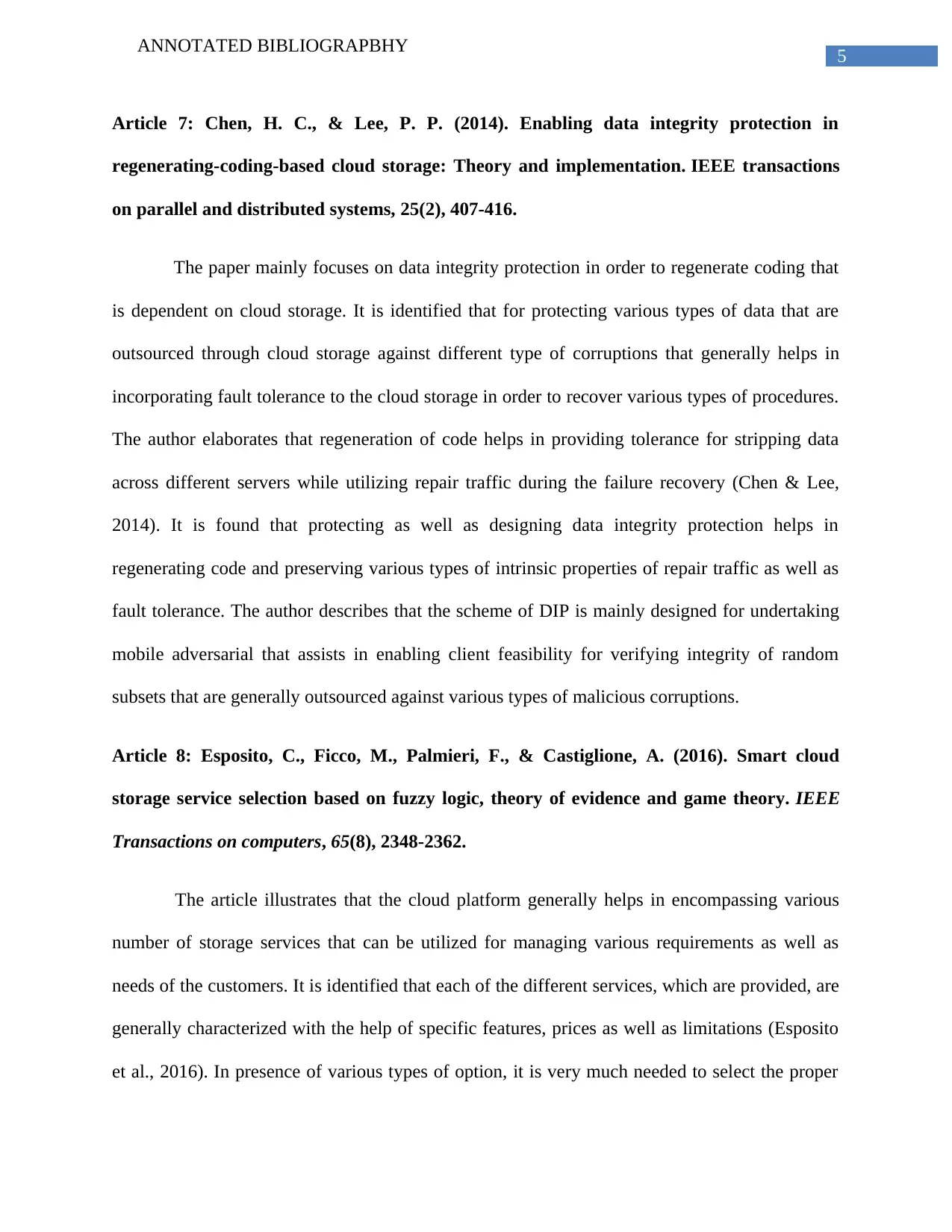
5
ANNOTATED BIBLIOGRAPBHY
Article 7: Chen, H. C., & Lee, P. P. (2014). Enabling data integrity protection in
regenerating-coding-based cloud storage: Theory and implementation. IEEE transactions
on parallel and distributed systems, 25(2), 407-416.
The paper mainly focuses on data integrity protection in order to regenerate coding that
is dependent on cloud storage. It is identified that for protecting various types of data that are
outsourced through cloud storage against different type of corruptions that generally helps in
incorporating fault tolerance to the cloud storage in order to recover various types of procedures.
The author elaborates that regeneration of code helps in providing tolerance for stripping data
across different servers while utilizing repair traffic during the failure recovery (Chen & Lee,
2014). It is found that protecting as well as designing data integrity protection helps in
regenerating code and preserving various types of intrinsic properties of repair traffic as well as
fault tolerance. The author describes that the scheme of DIP is mainly designed for undertaking
mobile adversarial that assists in enabling client feasibility for verifying integrity of random
subsets that are generally outsourced against various types of malicious corruptions.
Article 8: Esposito, C., Ficco, M., Palmieri, F., & Castiglione, A. (2016). Smart cloud
storage service selection based on fuzzy logic, theory of evidence and game theory. IEEE
Transactions on computers, 65(8), 2348-2362.
The article illustrates that the cloud platform generally helps in encompassing various
number of storage services that can be utilized for managing various requirements as well as
needs of the customers. It is identified that each of the different services, which are provided, are
generally characterized with the help of specific features, prices as well as limitations (Esposito
et al., 2016). In presence of various types of option, it is very much needed to select the proper
ANNOTATED BIBLIOGRAPBHY
Article 7: Chen, H. C., & Lee, P. P. (2014). Enabling data integrity protection in
regenerating-coding-based cloud storage: Theory and implementation. IEEE transactions
on parallel and distributed systems, 25(2), 407-416.
The paper mainly focuses on data integrity protection in order to regenerate coding that
is dependent on cloud storage. It is identified that for protecting various types of data that are
outsourced through cloud storage against different type of corruptions that generally helps in
incorporating fault tolerance to the cloud storage in order to recover various types of procedures.
The author elaborates that regeneration of code helps in providing tolerance for stripping data
across different servers while utilizing repair traffic during the failure recovery (Chen & Lee,
2014). It is found that protecting as well as designing data integrity protection helps in
regenerating code and preserving various types of intrinsic properties of repair traffic as well as
fault tolerance. The author describes that the scheme of DIP is mainly designed for undertaking
mobile adversarial that assists in enabling client feasibility for verifying integrity of random
subsets that are generally outsourced against various types of malicious corruptions.
Article 8: Esposito, C., Ficco, M., Palmieri, F., & Castiglione, A. (2016). Smart cloud
storage service selection based on fuzzy logic, theory of evidence and game theory. IEEE
Transactions on computers, 65(8), 2348-2362.
The article illustrates that the cloud platform generally helps in encompassing various
number of storage services that can be utilized for managing various requirements as well as
needs of the customers. It is identified that each of the different services, which are provided, are
generally characterized with the help of specific features, prices as well as limitations (Esposito
et al., 2016). In presence of various types of option, it is very much needed to select the proper
⊘ This is a preview!⊘
Do you want full access?
Subscribe today to unlock all pages.

Trusted by 1+ million students worldwide
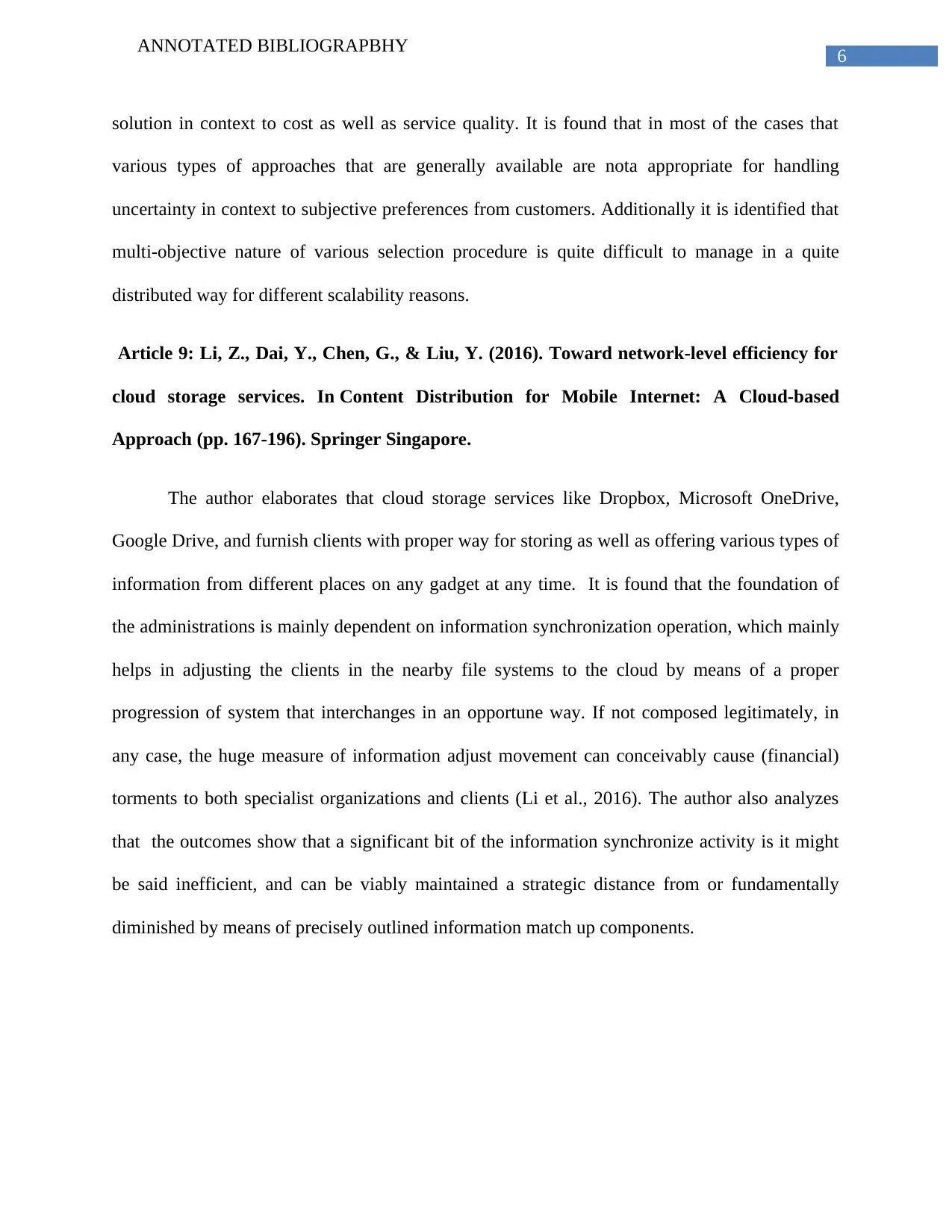
6
ANNOTATED BIBLIOGRAPBHY
solution in context to cost as well as service quality. It is found that in most of the cases that
various types of approaches that are generally available are nota appropriate for handling
uncertainty in context to subjective preferences from customers. Additionally it is identified that
multi-objective nature of various selection procedure is quite difficult to manage in a quite
distributed way for different scalability reasons.
Article 9: Li, Z., Dai, Y., Chen, G., & Liu, Y. (2016). Toward network-level efficiency for
cloud storage services. In Content Distribution for Mobile Internet: A Cloud-based
Approach (pp. 167-196). Springer Singapore.
The author elaborates that cloud storage services like Dropbox, Microsoft OneDrive,
Google Drive, and furnish clients with proper way for storing as well as offering various types of
information from different places on any gadget at any time. It is found that the foundation of
the administrations is mainly dependent on information synchronization operation, which mainly
helps in adjusting the clients in the nearby file systems to the cloud by means of a proper
progression of system that interchanges in an opportune way. If not composed legitimately, in
any case, the huge measure of information adjust movement can conceivably cause (financial)
torments to both specialist organizations and clients (Li et al., 2016). The author also analyzes
that the outcomes show that a significant bit of the information synchronize activity is it might
be said inefficient, and can be viably maintained a strategic distance from or fundamentally
diminished by means of precisely outlined information match up components.
ANNOTATED BIBLIOGRAPBHY
solution in context to cost as well as service quality. It is found that in most of the cases that
various types of approaches that are generally available are nota appropriate for handling
uncertainty in context to subjective preferences from customers. Additionally it is identified that
multi-objective nature of various selection procedure is quite difficult to manage in a quite
distributed way for different scalability reasons.
Article 9: Li, Z., Dai, Y., Chen, G., & Liu, Y. (2016). Toward network-level efficiency for
cloud storage services. In Content Distribution for Mobile Internet: A Cloud-based
Approach (pp. 167-196). Springer Singapore.
The author elaborates that cloud storage services like Dropbox, Microsoft OneDrive,
Google Drive, and furnish clients with proper way for storing as well as offering various types of
information from different places on any gadget at any time. It is found that the foundation of
the administrations is mainly dependent on information synchronization operation, which mainly
helps in adjusting the clients in the nearby file systems to the cloud by means of a proper
progression of system that interchanges in an opportune way. If not composed legitimately, in
any case, the huge measure of information adjust movement can conceivably cause (financial)
torments to both specialist organizations and clients (Li et al., 2016). The author also analyzes
that the outcomes show that a significant bit of the information synchronize activity is it might
be said inefficient, and can be viably maintained a strategic distance from or fundamentally
diminished by means of precisely outlined information match up components.
Paraphrase This Document
Need a fresh take? Get an instant paraphrase of this document with our AI Paraphraser
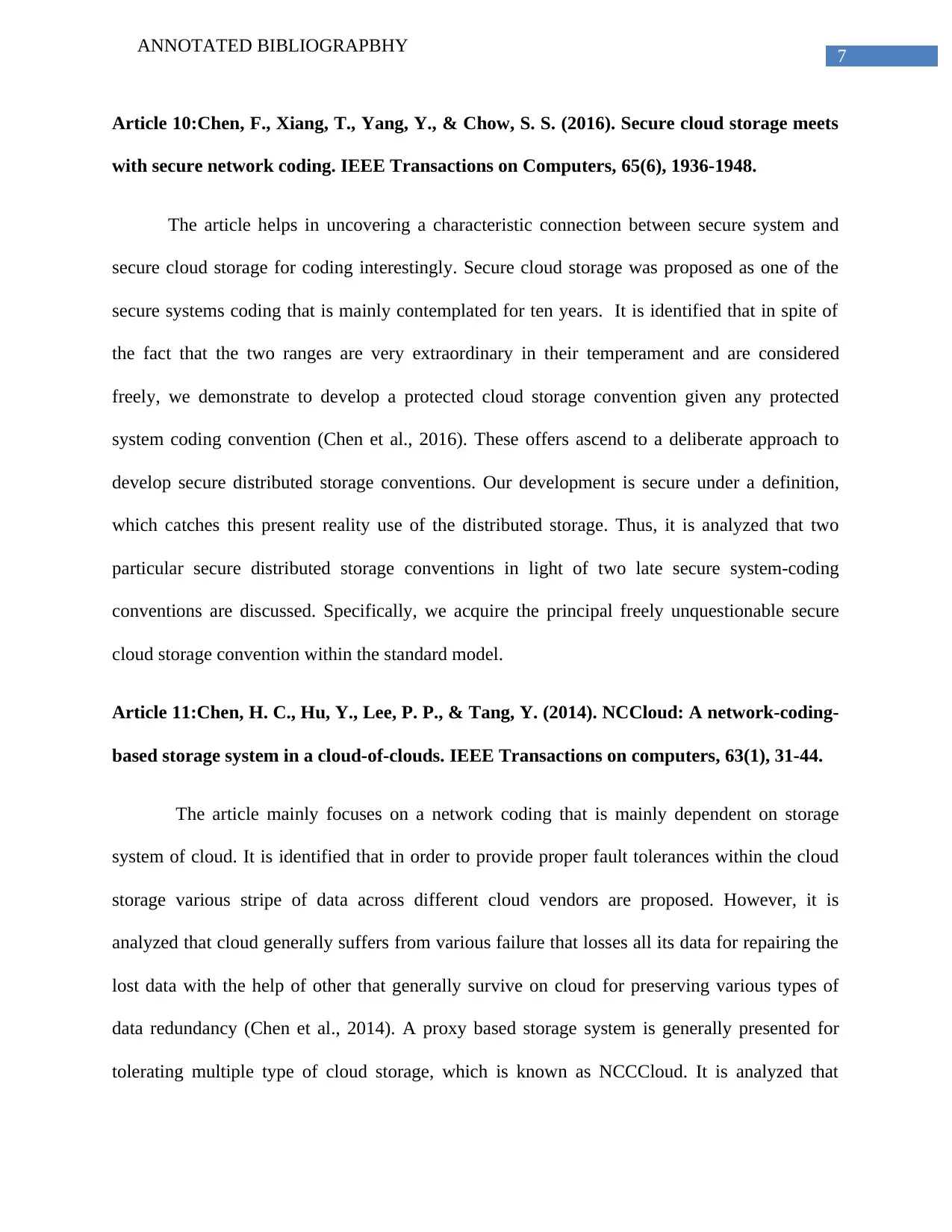
7
ANNOTATED BIBLIOGRAPBHY
Article 10:Chen, F., Xiang, T., Yang, Y., & Chow, S. S. (2016). Secure cloud storage meets
with secure network coding. IEEE Transactions on Computers, 65(6), 1936-1948.
The article helps in uncovering a characteristic connection between secure system and
secure cloud storage for coding interestingly. Secure cloud storage was proposed as one of the
secure systems coding that is mainly contemplated for ten years. It is identified that in spite of
the fact that the two ranges are very extraordinary in their temperament and are considered
freely, we demonstrate to develop a protected cloud storage convention given any protected
system coding convention (Chen et al., 2016). These offers ascend to a deliberate approach to
develop secure distributed storage conventions. Our development is secure under a definition,
which catches this present reality use of the distributed storage. Thus, it is analyzed that two
particular secure distributed storage conventions in light of two late secure system-coding
conventions are discussed. Specifically, we acquire the principal freely unquestionable secure
cloud storage convention within the standard model.
Article 11:Chen, H. C., Hu, Y., Lee, P. P., & Tang, Y. (2014). NCCloud: A network-coding-
based storage system in a cloud-of-clouds. IEEE Transactions on computers, 63(1), 31-44.
The article mainly focuses on a network coding that is mainly dependent on storage
system of cloud. It is identified that in order to provide proper fault tolerances within the cloud
storage various stripe of data across different cloud vendors are proposed. However, it is
analyzed that cloud generally suffers from various failure that losses all its data for repairing the
lost data with the help of other that generally survive on cloud for preserving various types of
data redundancy (Chen et al., 2014). A proxy based storage system is generally presented for
tolerating multiple type of cloud storage, which is known as NCCCloud. It is analyzed that
ANNOTATED BIBLIOGRAPBHY
Article 10:Chen, F., Xiang, T., Yang, Y., & Chow, S. S. (2016). Secure cloud storage meets
with secure network coding. IEEE Transactions on Computers, 65(6), 1936-1948.
The article helps in uncovering a characteristic connection between secure system and
secure cloud storage for coding interestingly. Secure cloud storage was proposed as one of the
secure systems coding that is mainly contemplated for ten years. It is identified that in spite of
the fact that the two ranges are very extraordinary in their temperament and are considered
freely, we demonstrate to develop a protected cloud storage convention given any protected
system coding convention (Chen et al., 2016). These offers ascend to a deliberate approach to
develop secure distributed storage conventions. Our development is secure under a definition,
which catches this present reality use of the distributed storage. Thus, it is analyzed that two
particular secure distributed storage conventions in light of two late secure system-coding
conventions are discussed. Specifically, we acquire the principal freely unquestionable secure
cloud storage convention within the standard model.
Article 11:Chen, H. C., Hu, Y., Lee, P. P., & Tang, Y. (2014). NCCloud: A network-coding-
based storage system in a cloud-of-clouds. IEEE Transactions on computers, 63(1), 31-44.
The article mainly focuses on a network coding that is mainly dependent on storage
system of cloud. It is identified that in order to provide proper fault tolerances within the cloud
storage various stripe of data across different cloud vendors are proposed. However, it is
analyzed that cloud generally suffers from various failure that losses all its data for repairing the
lost data with the help of other that generally survive on cloud for preserving various types of
data redundancy (Chen et al., 2014). A proxy based storage system is generally presented for
tolerating multiple type of cloud storage, which is known as NCCCloud. It is analyzed that
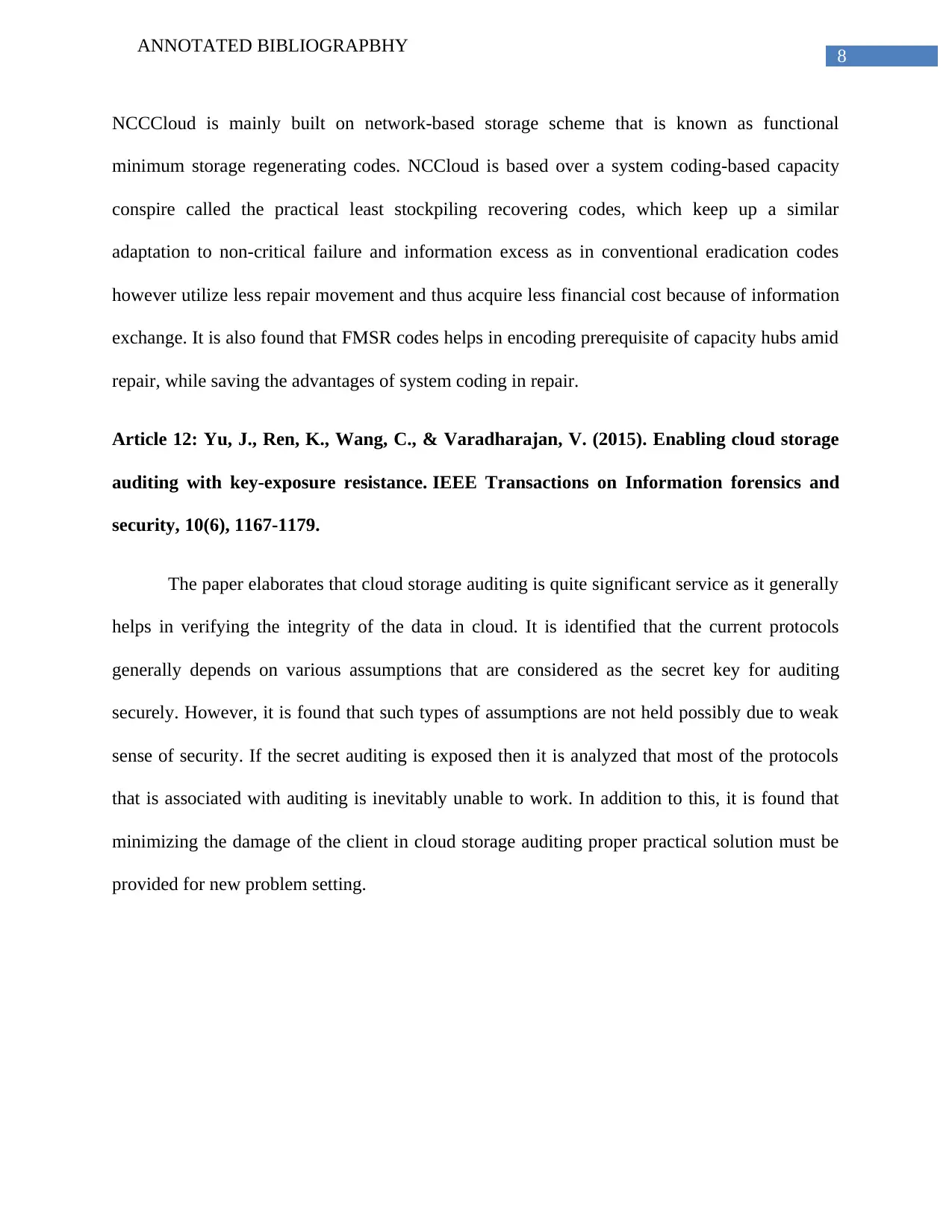
8
ANNOTATED BIBLIOGRAPBHY
NCCCloud is mainly built on network-based storage scheme that is known as functional
minimum storage regenerating codes. NCCloud is based over a system coding-based capacity
conspire called the practical least stockpiling recovering codes, which keep up a similar
adaptation to non-critical failure and information excess as in conventional eradication codes
however utilize less repair movement and thus acquire less financial cost because of information
exchange. It is also found that FMSR codes helps in encoding prerequisite of capacity hubs amid
repair, while saving the advantages of system coding in repair.
Article 12: Yu, J., Ren, K., Wang, C., & Varadharajan, V. (2015). Enabling cloud storage
auditing with key-exposure resistance. IEEE Transactions on Information forensics and
security, 10(6), 1167-1179.
The paper elaborates that cloud storage auditing is quite significant service as it generally
helps in verifying the integrity of the data in cloud. It is identified that the current protocols
generally depends on various assumptions that are considered as the secret key for auditing
securely. However, it is found that such types of assumptions are not held possibly due to weak
sense of security. If the secret auditing is exposed then it is analyzed that most of the protocols
that is associated with auditing is inevitably unable to work. In addition to this, it is found that
minimizing the damage of the client in cloud storage auditing proper practical solution must be
provided for new problem setting.
ANNOTATED BIBLIOGRAPBHY
NCCCloud is mainly built on network-based storage scheme that is known as functional
minimum storage regenerating codes. NCCloud is based over a system coding-based capacity
conspire called the practical least stockpiling recovering codes, which keep up a similar
adaptation to non-critical failure and information excess as in conventional eradication codes
however utilize less repair movement and thus acquire less financial cost because of information
exchange. It is also found that FMSR codes helps in encoding prerequisite of capacity hubs amid
repair, while saving the advantages of system coding in repair.
Article 12: Yu, J., Ren, K., Wang, C., & Varadharajan, V. (2015). Enabling cloud storage
auditing with key-exposure resistance. IEEE Transactions on Information forensics and
security, 10(6), 1167-1179.
The paper elaborates that cloud storage auditing is quite significant service as it generally
helps in verifying the integrity of the data in cloud. It is identified that the current protocols
generally depends on various assumptions that are considered as the secret key for auditing
securely. However, it is found that such types of assumptions are not held possibly due to weak
sense of security. If the secret auditing is exposed then it is analyzed that most of the protocols
that is associated with auditing is inevitably unable to work. In addition to this, it is found that
minimizing the damage of the client in cloud storage auditing proper practical solution must be
provided for new problem setting.
⊘ This is a preview!⊘
Do you want full access?
Subscribe today to unlock all pages.

Trusted by 1+ million students worldwide
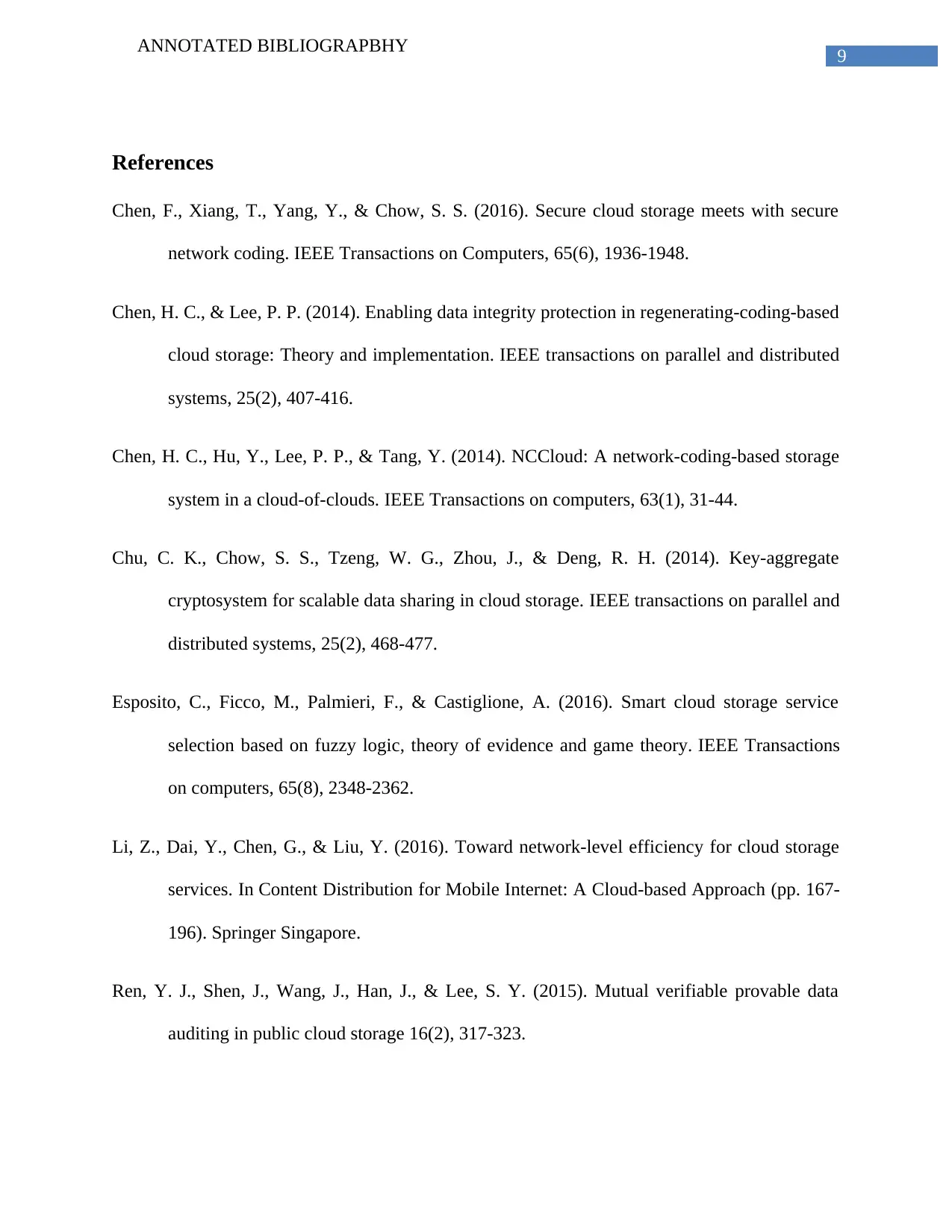
9
ANNOTATED BIBLIOGRAPBHY
References
Chen, F., Xiang, T., Yang, Y., & Chow, S. S. (2016). Secure cloud storage meets with secure
network coding. IEEE Transactions on Computers, 65(6), 1936-1948.
Chen, H. C., & Lee, P. P. (2014). Enabling data integrity protection in regenerating-coding-based
cloud storage: Theory and implementation. IEEE transactions on parallel and distributed
systems, 25(2), 407-416.
Chen, H. C., Hu, Y., Lee, P. P., & Tang, Y. (2014). NCCloud: A network-coding-based storage
system in a cloud-of-clouds. IEEE Transactions on computers, 63(1), 31-44.
Chu, C. K., Chow, S. S., Tzeng, W. G., Zhou, J., & Deng, R. H. (2014). Key-aggregate
cryptosystem for scalable data sharing in cloud storage. IEEE transactions on parallel and
distributed systems, 25(2), 468-477.
Esposito, C., Ficco, M., Palmieri, F., & Castiglione, A. (2016). Smart cloud storage service
selection based on fuzzy logic, theory of evidence and game theory. IEEE Transactions
on computers, 65(8), 2348-2362.
Li, Z., Dai, Y., Chen, G., & Liu, Y. (2016). Toward network-level efficiency for cloud storage
services. In Content Distribution for Mobile Internet: A Cloud-based Approach (pp. 167-
196). Springer Singapore.
Ren, Y. J., Shen, J., Wang, J., Han, J., & Lee, S. Y. (2015). Mutual verifiable provable data
auditing in public cloud storage 16(2), 317-323.
ANNOTATED BIBLIOGRAPBHY
References
Chen, F., Xiang, T., Yang, Y., & Chow, S. S. (2016). Secure cloud storage meets with secure
network coding. IEEE Transactions on Computers, 65(6), 1936-1948.
Chen, H. C., & Lee, P. P. (2014). Enabling data integrity protection in regenerating-coding-based
cloud storage: Theory and implementation. IEEE transactions on parallel and distributed
systems, 25(2), 407-416.
Chen, H. C., Hu, Y., Lee, P. P., & Tang, Y. (2014). NCCloud: A network-coding-based storage
system in a cloud-of-clouds. IEEE Transactions on computers, 63(1), 31-44.
Chu, C. K., Chow, S. S., Tzeng, W. G., Zhou, J., & Deng, R. H. (2014). Key-aggregate
cryptosystem for scalable data sharing in cloud storage. IEEE transactions on parallel and
distributed systems, 25(2), 468-477.
Esposito, C., Ficco, M., Palmieri, F., & Castiglione, A. (2016). Smart cloud storage service
selection based on fuzzy logic, theory of evidence and game theory. IEEE Transactions
on computers, 65(8), 2348-2362.
Li, Z., Dai, Y., Chen, G., & Liu, Y. (2016). Toward network-level efficiency for cloud storage
services. In Content Distribution for Mobile Internet: A Cloud-based Approach (pp. 167-
196). Springer Singapore.
Ren, Y. J., Shen, J., Wang, J., Han, J., & Lee, S. Y. (2015). Mutual verifiable provable data
auditing in public cloud storage 16(2), 317-323.
Paraphrase This Document
Need a fresh take? Get an instant paraphrase of this document with our AI Paraphraser
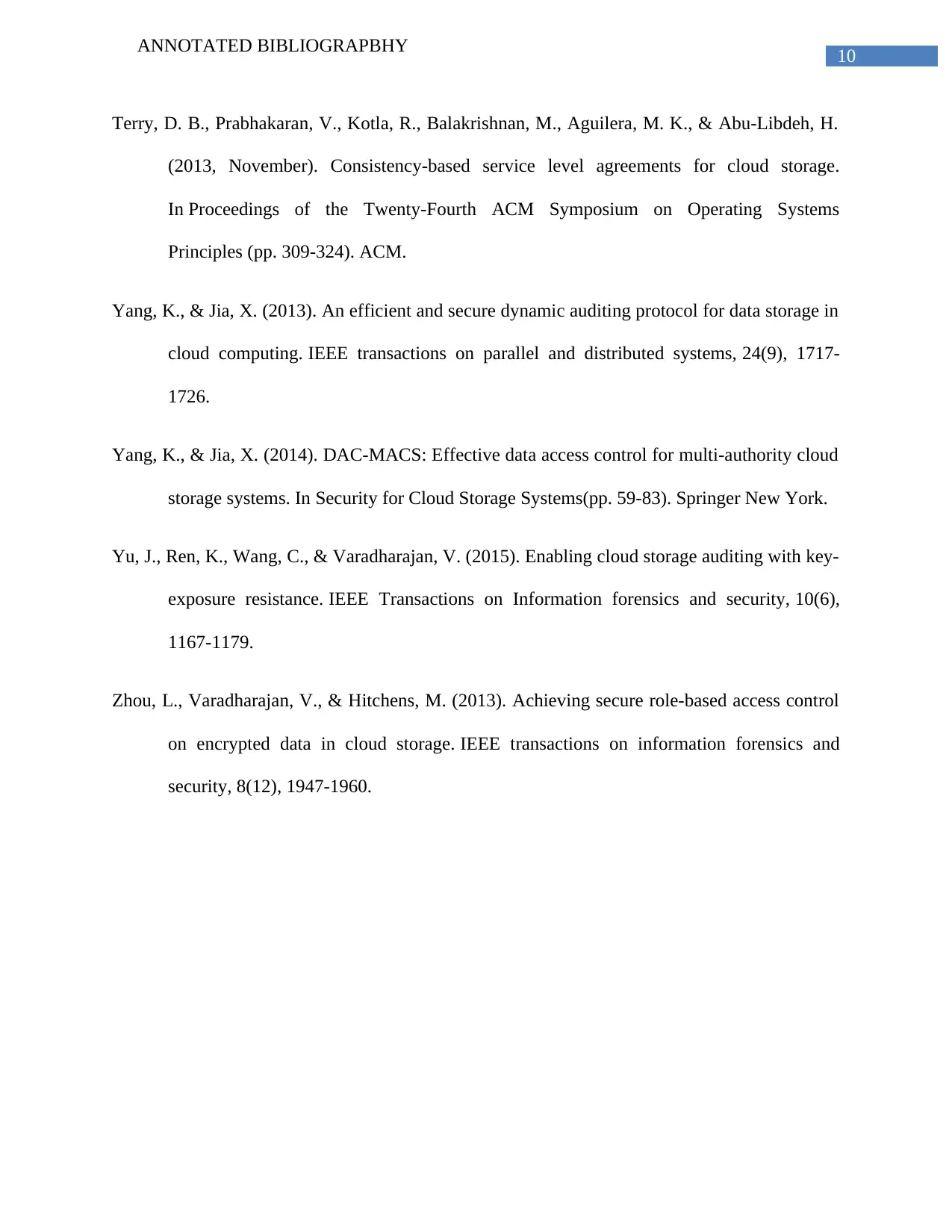
10
ANNOTATED BIBLIOGRAPBHY
Terry, D. B., Prabhakaran, V., Kotla, R., Balakrishnan, M., Aguilera, M. K., & Abu-Libdeh, H.
(2013, November). Consistency-based service level agreements for cloud storage.
In Proceedings of the Twenty-Fourth ACM Symposium on Operating Systems
Principles (pp. 309-324). ACM.
Yang, K., & Jia, X. (2013). An efficient and secure dynamic auditing protocol for data storage in
cloud computing. IEEE transactions on parallel and distributed systems, 24(9), 1717-
1726.
Yang, K., & Jia, X. (2014). DAC-MACS: Effective data access control for multi-authority cloud
storage systems. In Security for Cloud Storage Systems(pp. 59-83). Springer New York.
Yu, J., Ren, K., Wang, C., & Varadharajan, V. (2015). Enabling cloud storage auditing with key-
exposure resistance. IEEE Transactions on Information forensics and security, 10(6),
1167-1179.
Zhou, L., Varadharajan, V., & Hitchens, M. (2013). Achieving secure role-based access control
on encrypted data in cloud storage. IEEE transactions on information forensics and
security, 8(12), 1947-1960.
ANNOTATED BIBLIOGRAPBHY
Terry, D. B., Prabhakaran, V., Kotla, R., Balakrishnan, M., Aguilera, M. K., & Abu-Libdeh, H.
(2013, November). Consistency-based service level agreements for cloud storage.
In Proceedings of the Twenty-Fourth ACM Symposium on Operating Systems
Principles (pp. 309-324). ACM.
Yang, K., & Jia, X. (2013). An efficient and secure dynamic auditing protocol for data storage in
cloud computing. IEEE transactions on parallel and distributed systems, 24(9), 1717-
1726.
Yang, K., & Jia, X. (2014). DAC-MACS: Effective data access control for multi-authority cloud
storage systems. In Security for Cloud Storage Systems(pp. 59-83). Springer New York.
Yu, J., Ren, K., Wang, C., & Varadharajan, V. (2015). Enabling cloud storage auditing with key-
exposure resistance. IEEE Transactions on Information forensics and security, 10(6),
1167-1179.
Zhou, L., Varadharajan, V., & Hitchens, M. (2013). Achieving secure role-based access control
on encrypted data in cloud storage. IEEE transactions on information forensics and
security, 8(12), 1947-1960.
1 out of 11
Related Documents
Your All-in-One AI-Powered Toolkit for Academic Success.
+13062052269
info@desklib.com
Available 24*7 on WhatsApp / Email
![[object Object]](/_next/static/media/star-bottom.7253800d.svg)
Unlock your academic potential
Copyright © 2020–2026 A2Z Services. All Rights Reserved. Developed and managed by ZUCOL.



